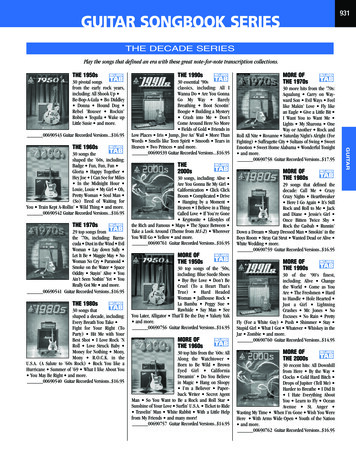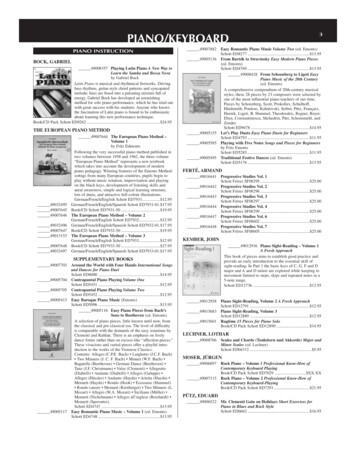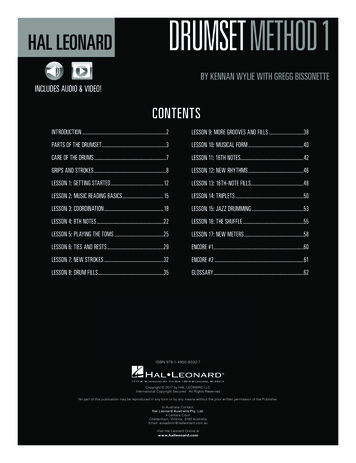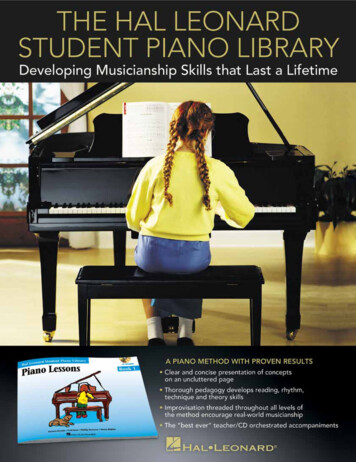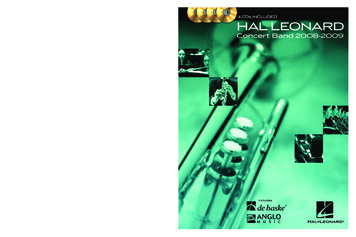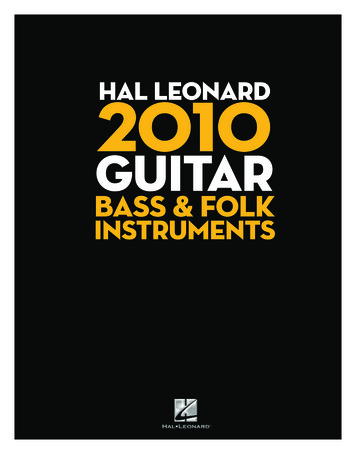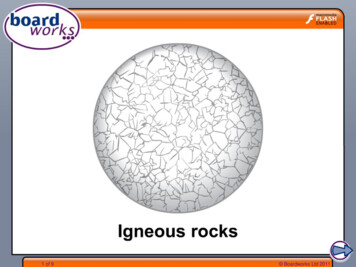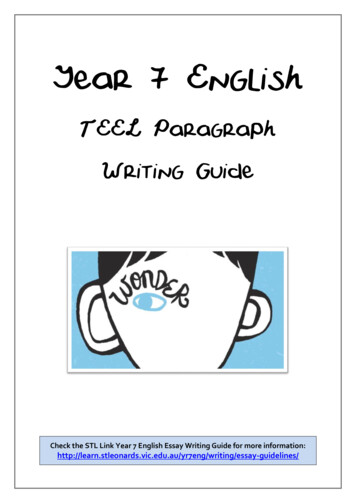
Transcription
Year 7 EnglishTEEL ParagraphWriting GuideCheck the STL Link Year 7 English Essay Writing Guide for more eng/writing/essay-guidelines/
CONSTRUCTING APARAGRAPHWhen you are starting out in essay writing, TEEL is a very useful acronym to use. It gives you anice, easy way to order your paragraphs and ensure you have a well-developed argument that isbacked up by evidence. For those of you who need a refresher, TEEL stands for:Topic sentenceExplainEvidenceLink‘T.E.E.L. paragraphs’ are the real guts of an essay. This is where you explore your ideas and provideyour arguments and evidence. An essay will have between 3 and 5 body paragraphs. Each paragraphwill need to be AT LEAST four sentences long, and will normally need to be longer. A typed paragraphshould not be more than half a page in length (with single line spacing).Each body paragraph will need to follow the T.E.E.L. formula. It will need: (1) a TOPIC SENTENCE; (2)an EXPLANATION; (3) EVIDENCE; and (4) a LINK. This is where the name ‘TEEL paragraph’ comes from.This is explained in detail on the following pages.You must make sure that each body paragraph has its own argument, which then links back/answersthe overarching Essay Topic. You need to be exploring an argument – if you are just retelling the story,they you are not showing a capacity to think or analyse, which is the purpose of the task.Below you can find two examples of body paragraphs:Charlotte remains politely neutral in the ‘Boy’s War’ that occurs in Wonder, which in the endrepresents a failure of her courage and kindness. Although Charlotte is polite to Auggie, showing himaround the school and introducing him to Beecher Prep, she never goes out of her way to be kind tohim or demonstrate friendship. Although Charlotte might wave hello, and acknowledge his presence,she does not shake Auggie’s hand or sit with him in class or willingly engage him in conversation. Thisis demonstrated in the first day of Mr. Browne’s class, when Charlotte gives Auggie “her little wave[before sitting] down at a desk in the front of the class”. Later in the novel, after she tells Jack Willabout the ‘Boys War’ between Jack and Julian, Charlotte “look[s] left and right outside the door tomake sure no one saw her”, which Auggie concludes is because “she didn’t want to be seen with[him]”. If Charlotte truly wanted to help Auggie, she could have demonstrated her bravery by beingseen in public with with him, or assisting him in other ways that showed her kinndess to the rest ofBeecher Prep. Thus, no matter what information Charlotte may pass information along to Auggie,behaviour towards him is ultimately lacking in courage and kindness.
Topic Sentence:The topic sentence is always the first sentence in a body paragraph. It should tell us what theparagraph will be about or what it will be arguing. By the time the reader has finished readingthe topic sentence, they should know EXACTLY what the paragraph will be discussing.A topic sentence needs to provide an argument, and it must relate to the essay topic.Here are some examples of topic sentences:Example One: Charlotte remains politely neutral in the ‘Boy’s War’ that occurs in Wonder, which inthe end represents a failure of her courage and kindness.Example Two: Via’s perspective show us how there is often more going on in a person’s head than isvisible in their interactions with others.Example Three: The bullying of Auggie and the “official sides” that people take shows that peopledon’t have to follow the crowd in order to make a positive difference.Stating an Argument:The first sentence in a paragraph should not simply be a statement of fact. A statement of fact is aclosed piece of information. An argumentative statement will require further evidence and examplesto support it, whereas a factual statement is much more simplistic and can be very easily proven,usually with a single quote from the book.Look at the following examples of argumentative statements and factual statements:Argumentative Statement:Summer demonstrates the truest forms of integrity and couragethrough her unconditional friendship with Auggie.Factual Statement:Summer is a brave person.Each of your body paragraphs will need to begin with an argumentative topic sentence. Look at thefollowing pairs of sentences and identify which one is the ARGUMENTATIVE statement and whichone is the FACTUAL statement:QUESTION 1Auggie demonstrates that personality is the most important thing when forming meaningfulfriendships.Auggie has many friends in the novel who enjoy his company.QUESTION 2Auggie’s always support him, taking him to school every day and providing him with encouragement.Auggie’s parents are the unrecognised heroes of Wonder.
Explain:In the next sentence or two, you will need to expand on your topic sentence. Explain what you meanin greater detail, and give it a more SPECIFIC FOCUS. This is where you can use some of those factualstatements and supporting details that you can’t use in your topic sentence.Ask yourself: What is it that you are trying to say or argue? What exactly do you MEAN?Pretend that you are talking to an alien. The alien doesn’t have much of an idea aboutwhat goes on here on Earth. When you tell him your topic sentence, it’s still a bit unsurewhat you mean. So now you need to spend a sentence or two explaining, in more detail,what you think is important, and what you are trying to argue.Returning to the earlier examples of topic sentences, here are two examples of basic expansions:Example One: Although Charlotte is polite to Auggie, showing him around the school and introducinghim to Beecher Prep, she never goes out of her way to be kind to him or demonstrate friendship.Although Charlotte might wave hello, and acknowledge his presence, she does not shake Auggie’s handor sit with him in class or willingly engage him in conversation.Example Two: If Charlotte truly wanted to help Auggie, she could have demonstrated her bravery bybeing seen in public with with him, or assisting him in other ways that showed her kindness to the restof Beecher Prep.Evidence:Now that you have put forward an opinion or an argument, you will need to provide someevidence to support these claims and show that you are right. This will usually be donethrough finding a relevant quote from the book you are studying.Ask yourself: What proof do you have that shows that your claim is correct? What in thetext supports your argument? What in the book made you think this was true?You can do this directly, for example by writing: This is demonstrated when Charlotte sees “ ”. OR Anexample of this can be seen when Dr Barnes says “ ” .Continuing on with the above paragraphs, here is an example of how you can incorporate evidence:Example One: This is demonstrated in the first day of Mr. Browne’s class, when Charlotte gives Auggie“her little wave [before sitting] down at a desk in the front of the class”.Example Two: Later in the novel, after she tells Jack Will about the ‘Boys War’ between Jack and Julian,Charlotte “look[s] left and right outside the door to make sure no one saw her”, which Auggie concludesis because “she didn’t want to be seen with [him]”.Hints for writing quotes: If you leave out some words, use ellipses: The mayor wanted to hear something“official under the health act” before taking action. If you need to change a word (e.g. from ‘talk’ to ‘talking’, or ‘I’ to ‘Charlotte’), use squarebrackets: the characters “were talk[ing] about ”; it is clear “that [Charlotte] will never ”
Link:Finally, you will provide a linking sentence, which summarises your paragraph in a sentence, linkingit back to the key terms from your topic sentence (or the essay topic, if one is provided). Thiswill happen after you have explained your argument and provided evidence.For example, you could begin your linking sentence by writing: “This shows that .”A linking sentence is very similar to a topic sentence: it needs to link everything back to the essay topicand offer a mini-conclusion of the evidence you provided in that paragraph.To round out the first examples Topic, Explaining and Evidence sentences above, here is an exampleof linking sentences:Example One: Thus, no matter what information Charlotte may pass information along to Auggie,behaviour towards him is ultimately lacking in courage and kindness.Putting it together:By putting all four of these elements together and in the correct order, we now have a fully formedbody paragraph. Using each ‘Example One’ from above, we now have a final paragraph that readslike this:Charlotte remains politely neutral in the ‘Boy’s War’ that occurs in Wonder, which in the endrepresents a failure of her courage and kindness. Although Charlotte is polite to Auggie, showing himaround the school and introducing him to Beecher Prep, she never goes out of her way to be kind tohim or demonstrate friendship. Although Charlotte might wave hello, and acknowledge his presence,she does not shake Auggie’s hand or sit with him in class or willingly engage him in conversation. Thisis demonstrated in the first day of Mr. Browne’s class, when Charlotte gives Auggie “her little wave[before sitting] down at a desk in the front of the class”. Later in the novel, after she tells Auggie aboutthe ‘Boys War’ between Jack and Julian, Charlotte “look[s] left and right outside the door to make sureno one saw her”, which Auggie concludes is because “she didn’t want to be seen with [him]”. IfCharlotte truly wanted to help Auggie, she could have demonstrated her bravery by being seen inpublic with with him, or assisting him in other ways that showed her kindness to the rest of BeecherPrep. Thus, no matter what information Charlotte may pass information along to Auggie, behaviourtowards him is ultimately lacking in courage and kindness.Use this checklist with each ofyour body paragraphs: Is there a TOPIC SENTENCE? (Does it tell us what the paragraph will discuss?) Is the topic sentence EXPANDED upon and explained in greater detail? (What does it all mean?) Is EVIDENCE provided to support this opinion? (Has it been incorporated/put into proper English?) Is there a final summarising sentence that LINKS back to the essay topic?
How to write in a‘formal’ wayAn essay is a very formal piece of writing, and as a result you need to write in a very formal way.Think about how Mr Davis speaks in assemble, or how a rule-book for sport is written, or anencyclopaedia entry: this is the type of voice that you need to use!The two examples below each convey similar information, but one reads much better than the otherbecause it has been written in a formal tone:I think Charlotte is a good character and it’s like she can do a lot of things that make us think she isreally smart, even though people will put her down for being a girl and she doesn’t come from a richbackground and other stuff like that. This is informal writing. You must NOT use it in an essay!Charlotte is a complex character, who must overcome the challenges presented by her age, genderand social circumstances. This is written with a more formal structure and use of language.There are some easy rules that will help you to write in a formal way. Follow these whenwriting your essay:Rule 1: Write in the Third PersonIn an essay you can never write in the first (I, me, my, we, etc) or second (you, etc) person.Everything you write must be in the third person (he, she, they, it, names/nouns, etc).THESE ARE BAD:THESE ARE GOOD:I think that It could be argued that In my opinion The character’s actions show that You see this when This can be seen when Let us look at An example of this is When we read about An important change occurs when
Rule 2: Do Not use contractionsAs a rule, you do not want to use contractions in an essay: write the words out in fullinstead. This is another quick and easy way to make your writing read more formally.A contraction is where two words are joined together and one or more letters are removed,replaced instead by an apostrophe.THESE ARE BAD:THESE ARE GOOD:didn'tdid notcan’tcannotthey’vethey haveain’tare notit’sit isthat’sthat isRemember that you still need to use apostrophes to show possession! You cannot simplystop using them entirely!Rule 3: Do Not Simply Write how you Speak !As was mentioned above, you should not simply write you essay as if you are talking about itto a friend. An essay is not a conversation: it is a piece of very formal writing.Many things are written in a formal way: newspaper reports, rule books, encyclopaedias,(most) textbooks, and so on. You can probably think of several people who speak in a veryformal way, such as your principal or a police officer.Avoid really casual sayings, like “the icing on the cake”, “she was dead meat” or “they bit offmore than they can chew”: we may say things like this to our friends, but you would want tosteer clear of them in a more formal setting.It can be a good idea to think of a very formal person and pretend that they are writing thisessay. What type of language would they use? What types of expressions would they avoid?
This type of formal, academic writing is used when a person needs to write in a very preciseand informative manner. Have a look at the following extracts from the AFL’s Laws ofAustralian Football 2012, and pay attention to how they are written:15.7 FREE KICKS – DELIBERATELY RUSHED BEHINDA free kick shall be awarded against a player from the defending team whointentionally kicks, handballs or forces the football over the attackingteam’s goal line or behind line or onto one of the attacking team’s goalPosts. In assessing whether a free kick should be awarded under this law,the field umpire shall give the benefit of the doubt to the defender.16.2 PLAYING FROM BEHIND THE MARKA player who has been awarded a mark or free kick shall dispose of thefootball from directly behind the mark. If a player disposes or attempts todispose of
Charlotte remains politely neutral in the oys War that occurs in Wonder, which in the end represents a failure of her courage and kindness. Although Charlotte is polite to Auggie, showing him around the school and introducing him to Beecher Prep, she never goes out of her way to be kind to him or demonstrate friendship. Although Charlotte might wave hello, and acknowledge his presence, she .

